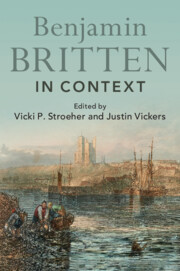Book contents
- Benjamin Britten in Context
- Composers in Context
- Benjamin Britten in Context
- Copyright page
- Dedication
- Contents
- Figures
- Tables
- Notes on Contributors
- Acknowledgements
- Bibliographic and In-Text Abbreviations
- Prologue
- Part I The Britten Circle(s)
- Part II British Musical Life
- Part III Britten and Other Composers
- Chapter 17 The Compositional Context
- Chapter 18 Responding to a British Musical Past
- Chapter 19 Britten and the English Musical Renaissance
- Chapter 20 Responding to the Continent
- Chapter 21 An English Tradition?
- Chapter 22 ‘An Exciting Time with All the Russians’
- Chapter 23 The Avant-Garde
- Part IV Wordsmiths, Designers, and Performers
- Part V British Sociocultural, Religious, and Political Life
- Further Reading
- Index
Chapter 22 - ‘An Exciting Time with All the Russians’
Anglo-Soviet Musical Contacts
from Part III - Britten and Other Composers
Published online by Cambridge University Press: 31 March 2022
- Benjamin Britten in Context
- Composers in Context
- Benjamin Britten in Context
- Copyright page
- Dedication
- Contents
- Figures
- Tables
- Notes on Contributors
- Acknowledgements
- Bibliographic and In-Text Abbreviations
- Prologue
- Part I The Britten Circle(s)
- Part II British Musical Life
- Part III Britten and Other Composers
- Chapter 17 The Compositional Context
- Chapter 18 Responding to a British Musical Past
- Chapter 19 Britten and the English Musical Renaissance
- Chapter 20 Responding to the Continent
- Chapter 21 An English Tradition?
- Chapter 22 ‘An Exciting Time with All the Russians’
- Chapter 23 The Avant-Garde
- Part IV Wordsmiths, Designers, and Performers
- Part V British Sociocultural, Religious, and Political Life
- Further Reading
- Index
Summary
It is well known that Britten visited the Soviet Union on five occasions between 1960 and 1971 and established warm friendships with members of the Soviet musical elite: Dmitri Shostakovich, Sviatoslav Richter, Mstislav Rostropovich, and Galina Vishnevskaya. Using a range of declassified archival material, this article places this engagement in the wider historical context of Anglo-Soviet political, commercial, and cultural relations, from the wartime alliance with Stalin to the collapse of the Soviet Union in 1991. It considers the operation of the Anglo-Soviet Cultural Agreement, alongside the importance of individuals such as the impresario Victor Hochhauser and a sequence of supportive British ambassadors and cultural attachés. It also examines the role of the British Council on the ground and some of the constraints placed upon this cultural engagement through resourcing and the rules of the political game. Finally, it assesses engagement beyond Britten’s lifetime, in the light of the visits of pop artists such as Sir Cliff Richard and the Bootleg Beatles to the Soviet Union and the first performances of works hitherto taboo, such as Elgar’s The Dream of Gerontius.
Keywords
- Type
- Chapter
- Information
- Benjamin Britten in Context , pp. 188 - 199Publisher: Cambridge University PressPrint publication year: 2022

